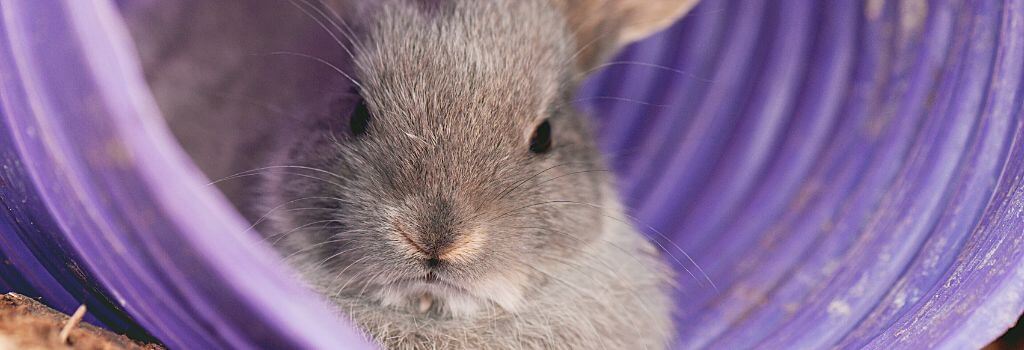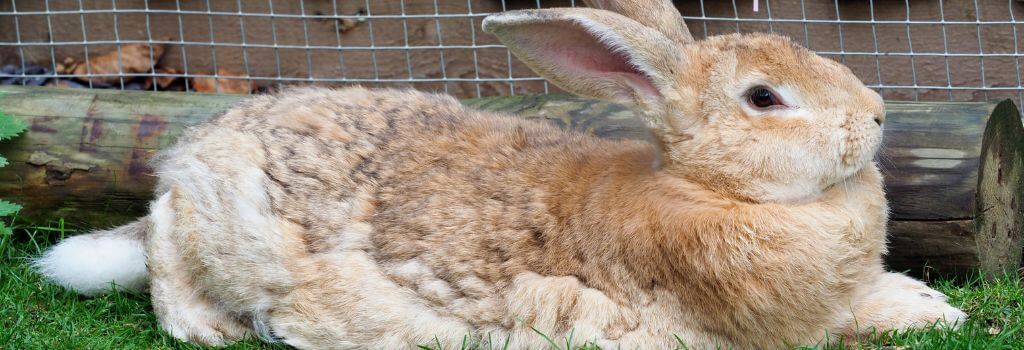Bringing a rabbit into your home is exciting, but it comes with the responsibility of creating a safe, comfortable, and engaging environment for your new furry friend. As veterinarians, we often see well-meaning rabbit owners who overlook crucial elements of a proper rabbit habitat.
To help ensure your bunny thrives in its new home, we've compiled a comprehensive list of essential items and considerations for building the perfect rabbit habitat. Let's hop right in!
1. Spacious Enclosure
The foundation of any rabbit habitat is a generously sized enclosure. Rabbits are active and need plenty of room to hop, stretch, and play. The minimum recommended size for a single rabbit is 4' x 2' x 2', but bigger is always better. Multi-level enclosures provide even more space for exploration and exercise.
When selecting an enclosure, opt for one with a solid bottom rather than wire, as wire floors can hurt your rabbit's sensitive feet. Make sure the bars are close enough together to prevent escapes, especially for smaller breeds.
2. Safe Flooring
Provide a soft, non-slip floor inside your rabbit's cage. Avoid slippery materials like linoleum or smooth plastic, which can lead to injuries. Instead, use rubber mats, foam tiles, or even old towels or blankets to create a comfy floor covering. Remember to wash these regularly to maintain hygiene.
3. Hiding Spots
Rabbits are prey animals by nature and need places to retreat when they feel stressed or want to rest. Include at least one hiding spot in your habitat. It could be a wooden hide-out, a cardboard box with entrance and exit holes, or another specially designed rabbit hideaway. These safe spaces help reduce anxiety and provide a sense of security for your pet.
4. Litter Box
Rabbits can be litter trained, making cleanup much easier for you. Choose a litter box that's large enough for your rabbit to comfortably use and easily access. Locate it in a corner of the enclosure, as rabbits often prefer to use the bathroom in one specific area. Fill the litter box with rabbit-safe, absorbent litter and a layer of hay, as rabbits like to eat while they do their business.
5. Hay Rack
Speaking of hay, it should make up about 85% of your rabbit's diet. A hay rack keeps the hay clean, dry, and easily accessible. Mount it at a height that allows your rabbit to reach it comfortably while standing on its hind legs. This position mimics natural grazing behavior and helps wear down your rabbit's continuously growing teeth.
6. Food and Water Stations
In addition to hay, your rabbit needs fresh water and a small amount of pellets daily. Choose heavy ceramic bowls that are difficult to tip over, or opt for a water bottle designed for rabbits. Place these away from the litter box to keep them clean and encourage your rabbit to move around the enclosure.
7. Toys and Enrichment Items
Rabbits are intelligent creatures that require mental stimulation to stay happy and healthy.

Include a variety of toys in your rabbit's habitat, such as:
- Chew toys made of cardboard or untreated wood
- Puzzle feeders that dispense treats
- Willow balls or rings
- Tunnels for exploring
- Digging boxes filled with shredded paper or safe substrate
Rotate toys regularly to keep your rabbit interested and prevent boredom.
8. Exercise Pen
While a well-designed enclosure is crucial, rabbits benefit from time outside their main living area. An exercise pen provides a safe space for your rabbit to explore and get additional physical activity. Set it up in a rabbit-proofed room or a secure outdoor area, and always supervise your rabbit while in their exercise pen — especially if it is outside.
9. Temperature Control
Rabbits are sensitive to temperature extremes. For optimal comfort, keep their habitat between 60-70°F (15-21°C). If you live in a warmer climate, consider adding a fan or air conditioning to the room where your rabbit lives. Provide extra bedding for warmth in colder areas, but avoid direct heat sources that could cause burns or overheating.
10. Proper Lighting
Rabbits love natural light, but their habitat should also have shaded areas. If the enclosure is in a room with windows, ensure your rabbit can access sunny and shaded spots. If natural light is limited, consider using full-spectrum lighting on a regular day/night cycle to support your rabbit's circadian rhythm.
11. Grooming Station
Regular grooming is essential for your rabbit's health and comfort. Set up a small grooming station near the enclosure with a brush, nail clippers, and other necessary tools. Having everything close by makes it easier to incorporate grooming into your daily routine and helps your rabbit associate the area with positive attention.
12. Health Monitoring Tools
Keep a small scale near your rabbit's habitat to monitor their weight regularly. Sudden weight changes can be early indicators of health issues. Additionally, keep a thermometer on hand to check the habitat's ambient temperature and ensure it stays within the optimal range.
13. Safe Electrical Management
Rabbits are notorious chewers, and electrical cords pose a serious hazard. Even if cords aren't directly inside the habitat, ensure all nearby wires are out of reach or protected with cord covers or PVC piping. This precaution is crucial when setting up your rabbit's enclosure and exercise areas.
14. Air Quality Maintenance
Good ventilation is crucial for your rabbit's respiratory health. Place the habitat in a well-ventilated area away from drafts.
15. Emergency Kit
Prepare for unexpected problems by keeping an emergency kit handy.
Include the following items in your rabbit's emergency kit:
- Critical care formula
- Syringes for feeding
- Styptic powder for minor cuts
- A small first-aid kit
- Your veterinarian's contact information

A Happy Home and Life for Your Rabbit
Creating the perfect habitat for your rabbit is an ongoing process that requires attention to detail and a deep understanding of your pet's needs. A well-designed living space ensures your rabbit's overall health and happiness, so take your time setting up their home.
While a great habitat is crucial, it's just one aspect of responsible rabbit ownership. Regular veterinary check-ups, a proper diet, and lots of love and attention are equally important.
If you have questions about setting up your rabbit's habitat or concerns about your pet's health, don't hesitate to schedule an appointment with your veterinarian. We're here to support you in providing the best care for your beloved rabbit.
Don't have a vet in your area yet? We can help you find a local veterinarian.
If you have more questions, the GeniusVets Teletriage platform will give you unlimited access to text and/or video calls with board-certified veterinarians! To learn more click here.
